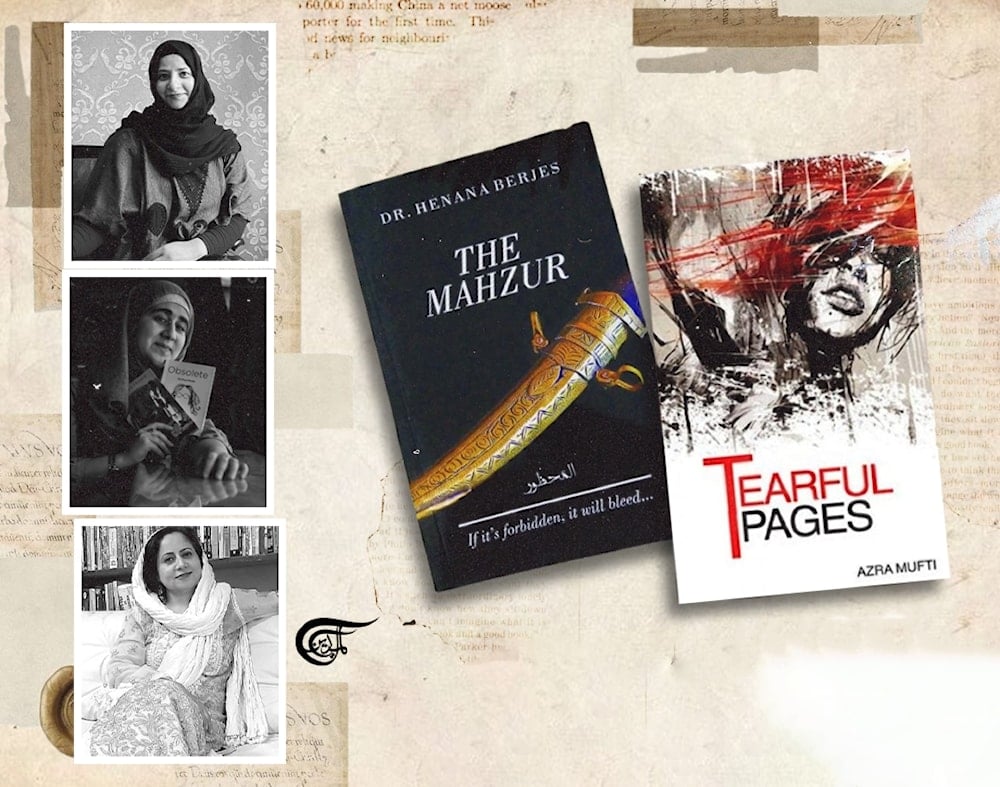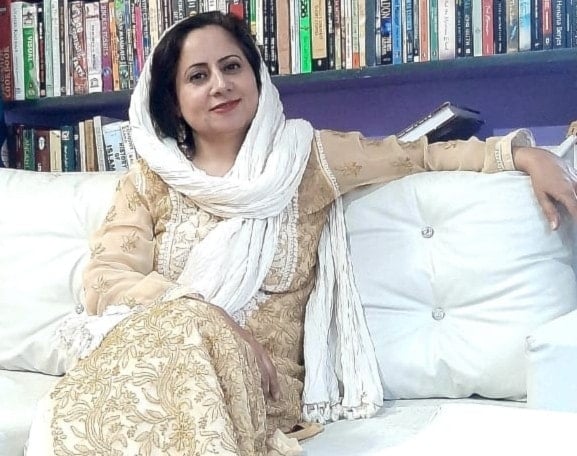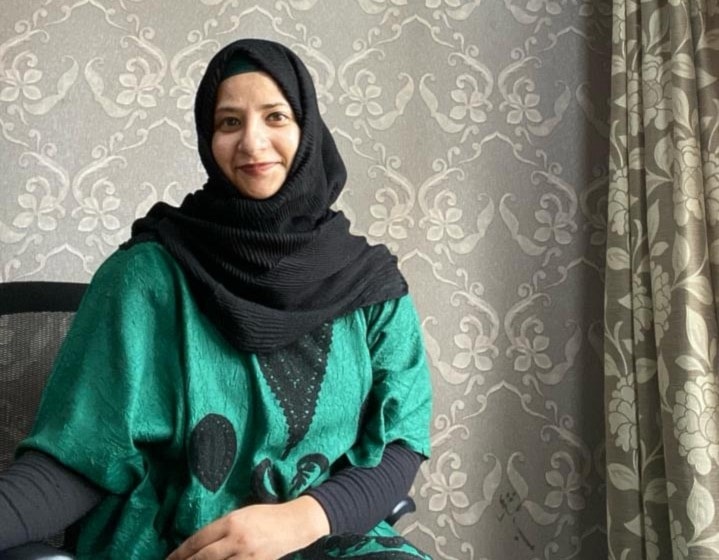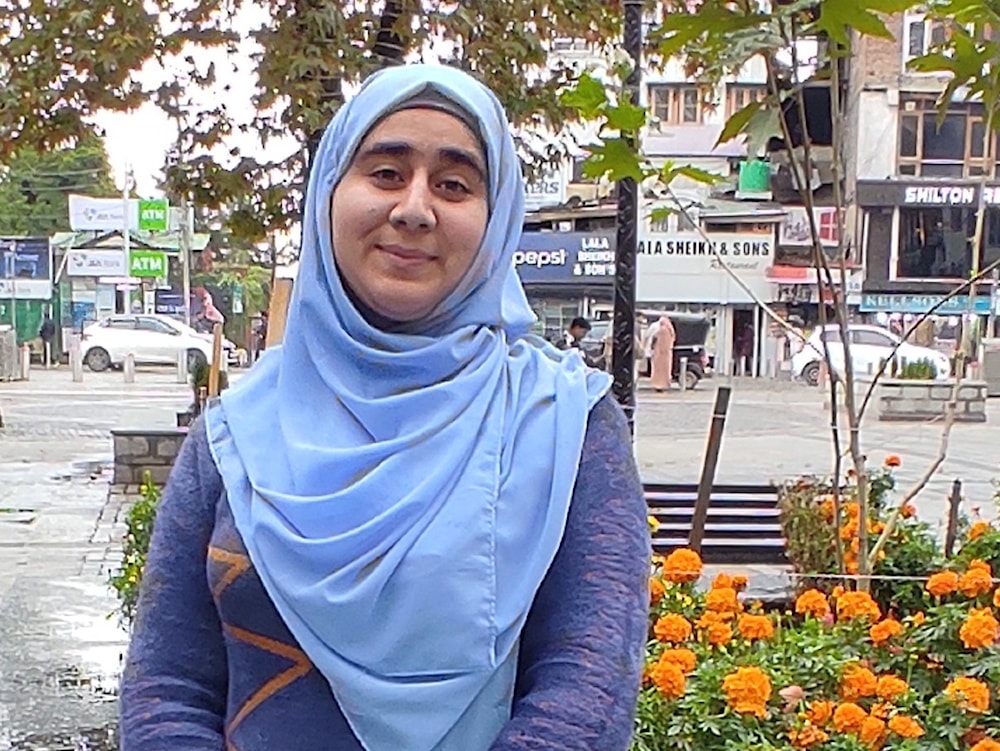In Indian Kashmir, more women are becoming authors to narrate their stories
In Kashmir, female writers are on the rise, winning awards and inspiring others to take up the mantle.
-

There has been a noticeable change in the classroom composition that used to be dominated by men. Now the classroom is mostly filled with female students who opt for literature as a career. (Al Mayadeen English; Batoul Hajj)
The English literature classroom at Cluster University in Srinagar, on the Indian side of Kashmir, is painted in a light off-white colour. Many students are waiting for their teacher to arrive and give a lecture to help them improve their writing skills.
Over time, there has been a noticeable change in the classroom composition that initially used to be dominated by men. However, the trend has shifted and now the classroom is mostly filled with female students who opt for literature as a career in order to become authors.
Henana Berjes, a resident of Srinagar, began her journey as an author by balancing the roles of a mother and a full-time doctor. Her first book “The Mahzur,” a Middle Eastern suspense thriller published in 2019, revolves around a love story of a couple belonging to opposite clans locked in an internal conflict.
“I often wonder what would I have been doing had it not been for writing,” Berjes told Al Mayadeen English. “The love for writing will keep me writing more. I believe there is a message that I need to get across and hence I'll keep writing,” the author added.
Berjes’s passion for writing continued beyond “The Mahzur” as she came up with two more books, “The Third Daughter,” that addresses the theme of discrimination against girls by shedding light on societal challenges, while the other book, “The Fault Lines Within,” has different short stories that explore human problems.
Berjes claims that she is engaged in writing two more books that are scheduled for release next year.
“My books have been well received and I am overjoyed by the profound connection forged through my words,” Berjes said. “The Mahzur” has its own fan base and with the release of its second edition I am confident it will ascend to the pinnacle of the charts,” she added.
-

Henana Berjes
The Indian side of Kashmir has a history of female authors. Professor Neetja Matoo, a writer, translator, and teacher with over three decades of experience in the valley, explored the journey of the ancient female authors of Kashmir in her book “Mystic and the Lyric for Women Poets in Kashmir.” The book looks at the history of Kashmir’s ancient female authors right from Lal Ded in the 14th century to Roopa Bhavani in the 17th century by showcasing their poetry, which challenged norms centuries ago.
Henna Amin, the Head of the School of Humanities & Liberal Arts at Amar Singh College, admits that there has been a noticeable change in the literary landscape of Kashmir. The present female generation of Kashmir, Amin said, are interested in telling their stories in order to vent out their feelings and thoughts.
“Women have been marginalized and silenced for ages. In recent times, female narrations have emerged as a powerful tool that challenges oppressive structures,” Amin said. “Local female authors are leaving their marks in various genres of literature. They deal with themes of identity, trauma and marginalization,” Amin told Al Mayadeen English.
“They are successful in creating a forceful and powerful narrative in Kashmir,” the professor said. “Kashmir has many young female writers living in who have carved a niche for them in the literary world,” she said, adding that their perspectives are fresh and impactful.
Azra Mufti, another resident of Baramulla district, has emerged as one of the prominent female voices from the region. Inspired by modern-day literature pioneers such as Shahnaz Bashir, a globally acclaimed and award-winning novelist from Kashmir, Mufti started writing short stories about women who had gone through trauma.
“This thing gives me an appreciation and I thought about writing something concrete on a bigger platform. I looked around and noticed women in our society are facing multiple issues,” Mufti said. “This triggered an idea of writing a book titled Tearful Pages in my mind,” she said, adding that people liked her work, inspiring her to continue writing.
Two years ago, Mufti chose to write about mental health, as she desired to touch on the basic fabric of society. The protagonist of her second book “Shattered Dreams” was based on a real-life story and she considers this story “close to her heart.”
“Female narratives were never an obstacle, as we have had female poets in the past. Internal disturbances somehow played a role in that no one tried to carry on the legacy,” Mufti told Al Mayadeen English. “I believe it is your responsibility to carry on the legacy, and I now believe that the present generation has taken up the task,” she added.
Mufti says many individuals seek her assistance to enhance their writing skills and bring their works to publication. She said that on multiple occasions she advised aspiring writers to immerse themselves in extensive literary reading.
“I told them once you attain proficiency where their content holds significance, then they can pursue publication avenues such as reaching out to established publishing houses or opting for self-publishing,” she concluded.
-

Azra Mufti
Amin, the professor, says many of her students, especially female writers, are smart, witty, and know how to play with words. “There are short story writers in my class and some of them have even written novels and got published,” she said. “It provides me with a sense of pride when I go through their work,” Amin said, adding that all of them will become wonderful writers in the future.
Sohila Shabir is one among the newly established authors in recent times, and has won literature awards for herself at an early age. Her life took a turn after she was given a double promotion in school, leaving her friends and classmates behind as a result, and she could not develop a bond with her new classmates.
“It was a tough moment for me. The sense of loneliness ignited a flame of writing in me in order to vent out my emotions,” Shabir said. “I got attracted towards writing, and later on I released my book which contained motivational quotes,” she added.
Shabir, being a student from a non-literary background, kept working on her writing skills. Her passion and love for literature continued, and she never looked back, and started writing her second book titled “Obsolete”.
“During my studies, I was inspired by the work of Habba Khatoon and Lal Ded, and wondered why those ancient authors were praised and mentioned in every household in Kashmir,” Shabir said. “I began to read their work, which inspired me to replicate the theme of Habba Khatoon revolving around love and destiny in my own words,” she added.
Shabir submitted her work to India World Records, and she topped the list and became the youngest author to recreate the writing style in Habba Khatoon's poems. She has also won other awards, including a title in the Asia Book of Records, and Best Poetry in Coimbatore Literary awards.
“People often question me if I am promoting Kashmiri culture, then why I choose English as a medium,” Shabir said. “I always replied that locals have taken our native language for granted, as no one is interested in learning Kashmiri, and therefore English was the only choice to carry on the legacy of the region for a better purpose,” she said, adding that she is learning Kashmiri in order to “connect the people of Kashmir with their ancestral roots.
-

Soliha Bashir

 Sabha Khan
Sabha Khan
 7 Min Read
7 Min Read








